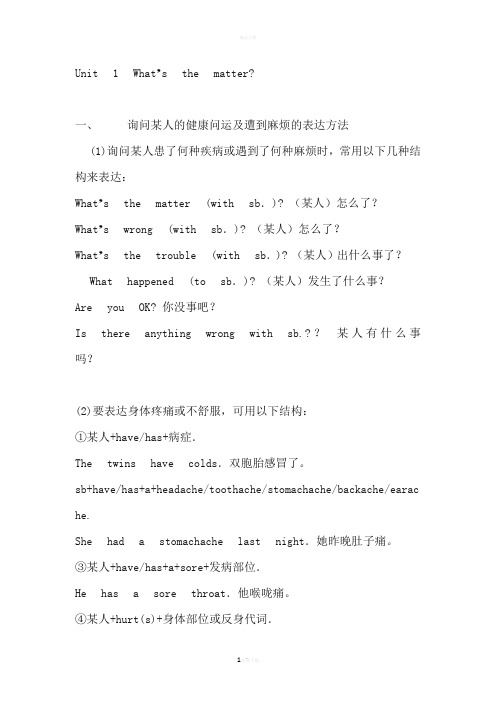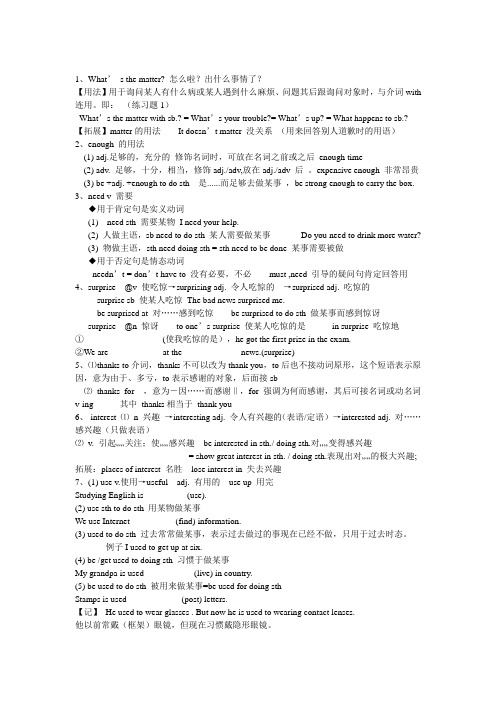Unit1What’s the matter
- 格式:ppt
- 大小:1.79 MB
- 文档页数:11

UnitIWhat'sthematter?一、询问某人的健康问运及遭到麻烦的表达方法(1)询问某人患了何种疾病或遇到了何种麻烦时,常用以下几种结构来表达:What,sthematter(withsb.)?(某人)怎么了?What,swrong(withsb.)?(某人)怎么了?WharSthetrouble(withsb.)?(某人)出什么事了?Whathappened(tosb.)?(某人)发生了什么事?AreyouOK?你没事吧?Isthereanythingwrongwithsb.??某人有什么事吗?(2)要表达身体难受或不舒适,可用以下结构:①某人+have∕has+病症.Thetwinshavecolds.双胞胎感冒了。
sb+have∕has+a+headache∕loothache∕stonιachache∕backache∕earache. Shehadastomachachelastnight.她昨晚肚子痛。
③某人+have∕has+a+sore+发病部位.HehaSaSorethroat.他喉咙痛。
④某人+hurt(三)+身体部位或反身代词.Hehurthisleg.他的腿受伤了。
⑤某部位+hurl(三).Myheadhurtsbadly.我头痛得厉害。
⑥某人+have∕has+apain+inone's+身体部位Ihaveapaininmychest.我胸口痛⑦(Thereis)soιnethingwrongwithone's+身体部位. Thereissomethingwrongwithmyrighteye.我的右眼有毛病。
⑧其他表达方式Shehasahearttrouble.她有心脏病。
Hegothitonthehead他头部受到了撞击。
Shecutherfinger.她割破手指了。
二、情态动词should的用法1.ShOIIld为情态动词,意为“应当:应当”,否定式为ShoUkIn'1,其后接动词原形,无人称和数的改变。

Unit1What’s the matter?一、询问某人的健康问运及遭到麻烦的表达方法(1)询问某人患了何种疾病或遇到了何种麻烦时,常用以下几种结构来表达:What’s the matter(with sb.)? (某人)怎么了?What’s wrong(with sb.)? (某人)怎么了?What’s the trouble(with sb.)? (某人)出什么事了?What happened(to sb.)? (某人)发生了什么事?Are you OK? 你没事吧?Is there anything wrong with sb.??某人有什么事吗?(2)要表达身体疼痛或不舒服,可用以下结构:①某人+have/has+病症.The twins have colds.双胞胎感冒了。
sb+have/has+a+headache/toothache/stomachache/backache/earac he.She had a stomachache last night.她昨晚肚子痛。
③某人+have/has+a+sore+发病部位.He has a sore throat.他喉咙痛。
④某人+hurt(s)+身体部位或反身代词.He hurt his leg.他的腿受伤了。
⑤某部位+hurt(s).My head hurts badly.我头痛得厉害。
⑥某人+have/has +a pain +in one’s+身体部位I have a pain in my chest.我胸口痛⑦(There is)something wrong with one’s+身体部位.There is something wrong with my right eye.我的右眼有毛病。
⑧其他表达方式She has a heart trouble.她有心脏病。
He got hit on the head他头部受到了撞击。

unit-1-what's-the-matter-教案(jiào àn)unit-1-what's-the-matter-教案(jiào àn)Unit 1 What’s the matter?教材(jiàocái)解读Go for it! 是以任务型语言教学(jiāo xué)为基础的英语教材,它体现(tǐxiàn)“以学生(xué sheng)为中心”和“以人为本”的教学思想,融话题、交际功能和语言结构于一体。
本书每个单元都列出明确(míngquè)的语言目标、主要的功能项目和语法结构、需要掌握的基本词汇,并分为Section A和Section B两部分。
Section A为目标句型提供分步事例和指导性练习;Section B使学生能够对已经学过的目标句型运用自如。
每个单元还附有Self Check部分,此部分是让学生用来测试自己现阶段的英语水平,即对本单元的语言目标的掌握程度有较为明确的认识。
第1单元(dānyuán)以What’s the matter?为中心话题(huàtí),让学生认知表示身体部1位的单词以及部分疾病的表达方法,描述身体不适和提出建议展开,学习和运用“What’s the matter?”和“What should…do?”让学生学会描述身体的不适和提出建议。
本课教材内容与学生的实际生活密切相关,易于引出学生运用简单的英语进行交际和交流,在学习活动(huó dòng)中,学生通过交换对身体不适的描述及建议,促进学生之间和师生之间的情感交流,增进情谊。
同时,在学习中养成良好的健康习惯。
单元(dānyuán)目标一、知识(zhī shi)与技能1. 知识目标:认知表示身体部位的单词以及部分疾病的表达方法。

Unit1What's the matter?短语总结—背诵版一、短语总结1.“(某人)怎么了?”表达(3+2+1+1)1.What’s the matter/trouble/problems(with sb.)?2.What’s wrong/up(with sb.)?3.(Is there)anything wrong(with sb.)?4.What happened to sb.?2.happen(意外地)发生(happen-happened-happened)1.take place(有计划地)发生2.take one’s place=take the place of sb.取代/代替某人的位置3.sth.happen(ed)to sb.某事发生在某人身上4.sb.happen(ed)to do sth.某人碰巧做某事3.“身体部位疼痛or不舒服”的表达(4)1.have a+疾病名词(headache/stomachache/toothache/其他疾病)2.have a sore+身体部位3.身体部位+hurt(s)4.have a pain in the+身体部位4.accident1.accidental adj.意外的accidentally adv.意外地2.by accident=accidentally意外地3.by mistake错误地5.lie1.lie in位于......(内部)2.lie to位于......(相隔海/省)3.lie on位于......(接壤)4.Iie ylie躺;位于lie-lay-lain lying lie down躺下lie on/in/to位于撒谎lie-lied-lied lie to sb.对某人撒谎lie about sth.对某事撒谎lay放置;下蛋lay-laid-laid laying lay down放下6.上下车1.get on/off+a/the bus/plane/train/metro/subway2.get in/into/out of+a/the taxi/car/van7.think v.思考;认为(think-thought-thought)1.think about思考;考虑2.think over=think about carefully仔细考虑3.think of认为;想起What do you think of...?=How do you like...?你认为...怎么样?4.think twice再三考虑;谨慎考虑8.surprise n./v.(surprise-surprised-surprised)1.to one’s surprise令某人吃惊的是2.in surprise=surprisingly吃惊地3.be surprised at对......感到吃惊4.be excited about对......感到激动5.be interested in对......感兴趣9.trouble n.麻烦(不可数)1.have trouble/problems/difficulty(in)doing sth.做某事有麻烦/问题/困难2.get into trouble陷入麻烦3.be in trouble在麻烦中10.fall v./n.(秋天)(fall-fell-fallen)1.fall behind sb.落后某人catch up with sb.赶上某人2.fall in love with sb./sth.爱上...../与......相爱3.fall down掉下4.fall over摔跤5.fall down from...=fall off...从......掉下6.fall asleep睡着11.run v.跑/经营(run-ran-run)1.run after...追赶...2.run away逃跑3.sb.run out of sth.某人用光/耗尽某物4.sth.run out某物花光/耗光5.run a shop/company/restaurant经营一家商店/公司/餐馆e n./v.使用(use-used-used)1.be useful=be of use有用的2.be useless=be of no use没有用的3.be used to(doing)sth.习惯于(做)某事4.be used to do sth.被用来做某事ed to do sth.过去常常做某事13.help n./v.帮助(help-helped-helped)1.help(sb.)to do sth.帮助某人做某事2.help sb.with sth.在某方面帮助某人3.can’t help doing sth.情不自禁/忍不住做某事4.help oneself to sth.自便/自取......(随便吃/喝......)5.with one’s help=with the help of sth.在某人的帮助下6.ask sb.for help=turn to sb.向某人寻求帮助14.own adj.自己的v.拥有(own-owned-owned)owner n.拥有者1.sb.own sth.=sb.be the owner of sth.某人拥有某物2.on one’s own=by oneself=alone独自地3.one’s own+n.(单/复)某人自己的......15.mean v.意思是/打算(mean-meant-meant)adj.刻薄的;吝啬的meaning n.意思;意义meaningful adj.有意义的meaningless无意义的1.mean to do sth.打算做某事2.mean doing sth.意味着做某事16.mind v.介意/在意(mind-minded-minded)n.决心;心智;思想;头脑1.make up one’s mind(to do sth.)下定决心(做某事)2.change one’s mind改变某人的主意3.keep......in mind记住......4.lose one’s mind失去理智;发疯5.in one’s mind=in one’s opinion=in one’s view在某人看来6.mind sb./one’s doing sth.介意某人做某事7.Never mind.(用于安慰)没关系;别担心;不要紧17.cut v.切割/砍(cut-cut-cut)1.cut up=cut...into pieces切碎2.cut off切掉3.cut down砍倒4.cut...in half对半切开18.keep v.保持;继续(keep-kept-kept)1.keep doing sth.保持做某事2.keep sb.doing sth.让某人保持做某事3.keep on doing sth.=go on doing sth.继续做某事4.keep/stop sb.from doing sth.阻止某人做某事19.risk(risk-risked-risked)1.be at risk=be in danger有危险的/在危险中2.take a risk=take risks冒险3.take the risk of sth.=be at the risk of sth.冒着......的风险4.risk doing sth.冒险做某事20.expect v.期待(expect-expected-expected)1.expect(sb.)to do sth.期待(某人)做某事2.expect that从句期待+宾语从句21.sick adj.生病的(定语、表语)ill adj.生病的(只作表语)1.sick-sicker-sickest ill-worse-worst2.be sick of sth.厌烦某事3.be tired of sth.厌倦某事22.breath n.呼吸breathe v.呼吸(breathe-breathed-breathed)1.breathe fresh air呼吸新鲜空气2.hold one’s breath屏住呼吸3.take a deep breath深呼吸4.be out of breath上气不接下气23.ready adj.准备好的1.get/be ready to do sth.准备好做某事2.get/be ready for sth.为......做好准备24.其他短语1.be in control of sth.控制/掌管/管理某事2.take one’s temperature量某人的体温3.take the medicine吃药take pills吃药片4.the rest of sth./sb.剩下的某物/某人5.right away=right now=at once立刻;立即;马上6.get out of...从......出来/离开......。

1、What’s the matter? 怎么啦?出什么事情了?【用法】用于询问某人有什么病或某人遇到什么麻烦、问题其后跟询问对象时,与介词with 连用。
即:(练习题1)What’s the matter with sb.? = What’s your trouble?= What’s up? = What happens to sb.? 【拓展】matter的用法It doesn’t matter 没关系(用来回答别人道歉时的用语)2、enough 的用法(1) adj.足够的,充分的修饰名词时,可放在名词之前或之后enough time(2) adv. 足够,十分,相当,修饰adj./adv,放在adj./adv 后。
expensive enough 非常昂贵(3) be +adj. +enough to do sth 是......而足够去做某事,be strong enough to carry the box.3、need v 需要◆用于肯定句是实义动词(1) need sth 需要某物I need your help.(2) 人做主语,sb need to do sth 某人需要做某事Do you need to drink more water?(3) 物做主语,sth need doing sth = sth need to be done 某事需要被做◆用于否定句是情态动词needn’t = don’t have to 没有必要,不必must ,need 引导的疑问句肯定回答用4、surprise @v 使吃惊→surprising adj. 令人吃惊的→surprised adj. 吃惊的surprise sb 使某人吃惊The bad news surprised me.be surprised at 对……感到吃惊be surprised to do sth 做某事而感到惊讶surprise @n 惊讶to one’s surprise 使某人吃惊的是in surprise 吃惊地①__________________(使我吃惊的是),he got the first prize in the exam.②We are ____________at the _____________news.(surprise)5、⑴thanks to介词,thanks不可以改为thank you,to后也不接动词原形,这个短语表示原因,意为由于、多亏,to表示感谢的对象,后面接sb⑵thanks for ,意为―因……而感谢‖,for强调为何而感谢,其后可接名词或动名词v-ing 其中thanks相当于thank you6、interest ⑴n 兴趣→interesting adj. 令人有兴趣的(表语/定语)→interested adj. 对……感兴趣(只做表语)⑵v. 引起……关注;使……感兴趣be interested in sth./ doing sth.对……变得感兴趣= show great interest in sth. / doing sth.表现出对……的极大兴趣; 拓展:places of interest 名胜lose interest in 失去兴趣7、(1) use v.使用→useful adj. 有用的use up 用完Studying English is__________(use).(2) use sth to do sth 用某物做某事We use Internet __________(find) information.(3)used to do sth 过去常常做某事,表示过去做过的事现在已经不做,只用于过去时态。

第一单元短语、句子What’ s the matter?怎么啦?出什么事情了?What’ s the matter with you?= What’s the trouble/problem with you?= What’ s wrong with you?= What happened (to you)?=Is there anything wrong (with you )?Section 短语1.患(重)感冒2.发烧/咳嗽3.头痛/胃痛/牙痛/背痛4.背痛/喉咙痛5.患心脏病6.躺下休息7.喝点蜂蜜热茶8.看牙医9.拍X光片10.量体温11.吃药12.在伤口上敷药13.割/切/擦伤自己14.做某事伤了自己15.远离电脑16.看医生17.期待某人做某事18.等下一班车19.照看好某人20.偶然;意外地21.看见某人在做某事22.大声呼救23.认真思考;权衡利弊24.下车/上车25.让某人感到惊奇的是26.同意做某事同意某人的观点27.多亏;因为;由于28.及时29.陷入麻烦30.考虑自己31.救命32.摔倒;跌倒句子1、你怎么了?2、她该怎么办呢?她应该喝些蜂蜜热茶。
3、我应该量一下体温吗?4、你晚上不应该出去。
5、我想我以同样的姿势一动不动地坐得太久了。
6、回家路上,我看见一条狗正躺在地上。
7、多亏了王老师,我取得了好成绩。
Section B短语33.用绷带包扎伤口34.在水下冲洗伤口35.按压住鼻子的两边36.放弃做37.用……来做……被用于做某事习惯于(做)某事38.让自己活得自在39.休息几天40.在烈日下41.感觉病了/感到不舒服42.划伤了膝盖43.流鼻血44.伤了背45.碰了头46.晒伤47.呼吸有问题48.被球打/碰了49.爬山(活动)50.去爬山51.对……有兴趣52.冒险53.失去生命54.因为55.亲自;独自56.(主语为物)耗尽;用光(主语为人)耗尽;用光57.准备做某事58.切掉他一半右臂59.失血太多60.左右为难;进退两难61.在困难的情况下62.摆脱;脱离63.学好英语的重要性64.做出好决定65.掌控一生66.坚持爬山67.活着还是死亡68.发生事故69.放弃做句子1、他在学习英语方面有困难。
Unit 1 What’s the matter?Page oneWhat’s the matter? 怎么了?出什么事了?通常用来询问某人患了某种疾病或者遇到什么麻烦。
例如果要问某人怎么了用:What‘s the matter with sb?如:他怎么了?What’s the matter with him? (with是介词,后边的sb要用人称代词的宾格:你/你们you, 他him, 她her,他/她/它们them, 它it,我me,我们us)除了用What’s the matter?来询问,我们还可以这样问,也就是它的同义句:What’s the problemWhat’s the trouble with sb ?What’s wrong也可以用以下句型:*. What’s one’s trouble / problem ?*. What’s up ?*. What happened to sb ?*. Are you OK ?*. Is there anything wrong with sb ?在用该句型回答表达身体不适或疼痛时,以书上句型为例:What’s the matter?句型一:I have a cold. 该句型为:Sb + have /has + a / an + 疾病名称eg: have a cold(患感冒) / fever / cough句型二:I have a sore back. 该句型为:Sb + have/ has a sore +身体部位eg:have a sore throat / back...句型三:I have a stomachache. 该句型为:Sb + have / has+ a+ 身体部位+ache(构成疾病名词) eg:have a toothache /headache / stomachache / earache /backache扩展句型:*.Sb + hurt(s) +身体部位/ oneself ; He hurt his leg .*.Sb +身体部位+ hurts ; My head hurts badly .*.There is something wrong with one’s +身体部位。
What’s the matter1.What’s the matter?= What’s the trouble?=What’s wrong? 怎么了?(wrong 错误的,有毛病的)2.What’s the matter with you? 你怎么了?What’s the trouble with her? 她怎么了?What’s wrong with the computer? 电脑怎么了?感冒发烧咳嗽头疼胃疼,肚子疼牙疼背疼,腰疼背疼,腰疼喉咙痛脖子疼腿疼疼; 使……受伤My head hurts. = I have a headache. 我头疼。
I hurt my leg. 我伤到了腿。
You hurt my heart/feelings. 你伤了我的心/感情。
5.He has a bad/terrible cold. 他得了重感冒。
He has a high fever. 他发高烧。
6.with prep. 用We look with our eyes. 我们用眼睛看。
Don't write with a pencil. 别用铅笔。
7.lie v. 躺;撒谎;位于n. 谎言 tell lies 撒谎A boy is lying on the grass. (lie - lying)Don't lie. = Don’t tell lies. 别撒谎。
Shandong lies in the east of China.山东位于中国东部。
8.休息一下 have a rest = have a break=take a rest =take a break9.carry 运,搬,提,背He is carrying a big bag his back.他背着一个大包。
10.There is something wrong with………有毛病。
11.There is nothing wrong with………没毛病。
Unit1 What’s the matterSection A1. What’ s the matter? 怎么啦?出什么事情了?【解析】matter/ ' mætə(r)) /n.问题;事情What’ s the matter with you?= What’s the trouble with you?= What’ s wrong with you?你怎么了?【注】:matter 和trouble 为名词,其前可加the 或形容词性物主代词,wrong 是adj. 不能加the【用法】用于询问某人有什么病或某人遇到什么麻烦、问题其后跟询问对象时, 与介词with连用。
即:What’s the matter with sb.?= What’s your trouble?= What’s up?= What happens to sb.?【拓展】matter的用法(1) It doesn’t matter 没关系(用来回答别人道歉时的用语)( ) —I’m sorry to break your pen. —_______A. That’s rightB. It doesn’t matterC. Thank you2. I have a cold 我感冒了I have a stomachache 我患胃痛I have a sore back. 我背痛。
【解析1】have a cold 受凉;感冒have a/an + 疾病名词“患……病” (cold/fever/cough)have a sore throat 患喉咙痛have a fever 发烧have a cold =catch a cold 患感冒have a toothache患牙痛have a headache 患头痛have a backache 患背痛①Mike’s sister _________________(not have) a stomachache.【解析2】back n 背;背部go/come back 返回give back 归还3.hand n 手v. 交给;传递hand in 上交hand on 依次传递hand out 分发4. She talked too much yesterday and didn’t drink enough water.她昨天说话太多了并且没有喝足够的水。